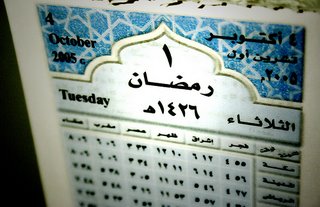Malay Days
 A few days ago, I blogged about how everytime we say the name of the day in English, we inadvertently pay homage to either a Roman or Germanic god of old. A reader commented I should also blog one about how the Islamic/Malay days came into being and several other commentators have come up with their own versions. Like they say in the cooking show, let's take a finished blog out of the oven as I have prepared this one earlier.
A few days ago, I blogged about how everytime we say the name of the day in English, we inadvertently pay homage to either a Roman or Germanic god of old. A reader commented I should also blog one about how the Islamic/Malay days came into being and several other commentators have come up with their own versions. Like they say in the cooking show, let's take a finished blog out of the oven as I have prepared this one earlier.Names of days around the world come in one of two varieties (trust me, I have been reading up on these) - those following closely the Latin/Germanic gods or those which follow the numeric days. Because of close relationship of the languages and religions in the middle east, the Islamic week is originally derived from the Jewish week, as was the medieval Christian week. All of these have numbered weekdays in common. All three also coincided with the Sunday through Saturday planetary week. The Islamic and Jewish weekdays begin at sunset, whereas the medieval Christian and planetary weekdays begin at the following midnight some six hours later.
The Islamic/Malay days are easier as the numbered days are derived from the Arabic numerals themselves with slight modifications. If you recall, the Arabic numbers are wahid or ahad (one), ithinin (two), thalatha (three), arba'a (four), khamsa (five), sita (six) and seven (saba'a). In Arabic, the days are then known as yaum as-sabt (sabbath day), yaum al-ahad (first day), yaum al-ithnayn (second day), yaum ath-thalatha' (third day), yaum al-arba`a' (fourth day), yaum al-khamis (fifth day) and yaum al-jum`a (gathering day).
From these Arabic words, we then derived Ahad as Sunday, Isnin as Monday, Selasa as Tuesday, Rabu (from arba'a) as Wednesday and Khamis (from khamsa) as Thursday and sabtu (from saba'a) as Saturday. However for Friday, it is Jumaat. If you noticed the Brunei Malay numbers are slightly off by one day. We tend to say Monday as Hari Satu or First Day but Ithninin actually is the number two, Tuesday is known as Hari Dua or Second Day but Thalatha is the number three and so on until Sabtu as Hari Enam. Some older folks called Ahad as Hari Tujuh even though it is supposed to be the first day of the week. Ahad is more popularly known as Hari Minggu nawadays.
What's interesting is that under the ISO 8601 standard - Monday is considered as the first day of the week and Sunday as the seventh day. So the Brunei usage complies with ISO!
On an interesting note too - some countries which practices numeric days have some slight variations. In Polish, their second to fifth days (Tuesday to Friday are called that) but for Sunday, their word 'niedziela' means 'no work' and for Monday it is 'poniedzialek' which is 'after no work'. Their saturday is 'sabota'. Similarly for Russians, their sunday is 'voskresenye' meaning 'resurrection' and monday 'ponedel'nik' meaning 'after no work'. For Vietnamese, their sunday is known as 'chu nhat' meaning 'master's day' and then for Monday to Friday, theirs are known as second day to seventh day. The only straight numbered days are the Jewish days for the first six days but their Saturday is known as the sabbath. The Icelandic word for Saturday is 'laugardagur' meaning 'washing day'. In Persian, Friday is known as 'adineh' meaning 'day of faith' but their saturday is known as 'shanbeh' meaning 'night and day'. I am not sure why that is called that, but some celebrations seemed to be in order here.
The name of days are quite fun!


Comments